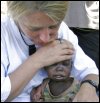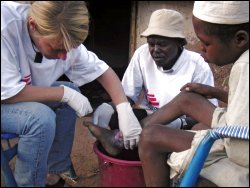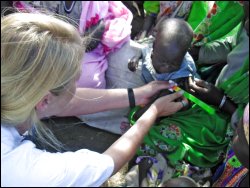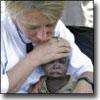MSF nurse Rakel Ludviksen and her colleague Jean Pierre Amigo spent November in the Jebel Si mountains, an extremely remote region of North Darfur, Sudan.
Doctors Without Borders/Médecins Sans Frontières (MSF) nurse Rakel Ludviksen and her colleague Jean Pierre Amigo spent November in the Jebel Si mountains, an extremely remote region of North Darfur, Sudan. Together they organized an immunization campaign and vaccinated more than 8,000 children against measles. They also screened almost 4,000 children for malnutrition and provided 400 medical consultations, mainly for diarrhea, skin infections, respiratory infections and conjunctivitis. After a couple of days in the Sudanese capital, Khartoum, they have again returned to the Jebel Si to set up a permanent health clinic there.
|

|
Q: What are living conditions like for people living in the Jebel Si region?
Jean Pierre Amigo:
The Jebel Si region is extremely isolated and the area is still insecure. We had to drive for three hours from the MSF base in Kebkabyia town to reach the area and on the journey we saw hardly anyone - few other vehicles, no people, no cattle. It's a dry, rocky place with little vegetation and no water at all - it's certainly not easy to live there. Even when we crossed the many 'wadis' - the riverbeds - they were completely dry.
Everywhere we went we saw burnt down villages, completely empty after having been attacked earlier this year. Everyone we met had lost someone close to them. Even though the major attacks occurred a while ago, the people here are strongly affected by the memory of what happened.
People now live scattered in the mountains, most of them outside their home villages. Food is scarce: most livestock has been looted and the small food stocks from this year's harvest are nowhere near sufficient. The water is simply undrinkable. There are no medical supplies reaching the area.
It is obvious to us that the situation will deteriorate drastically in the coming year in terms of food, water quality, and medical care if proper assistance is not provided. The mountain area has a challenging climate, with extremely hot days and, in winter, extremely cold nights. The wind can be rough at night. Blankets will save lives.
Q: Why was tackling measles a priority for MSF?
Rakel Ludviksen:
Although measles is unlikely to kill a well-nourished, otherwise healthy child, it is easily fatal for children already weakened by malnutrition. That's why protecting children against measles is always a priority in emergency situations. In the Jebel Si, people are really living in extremely difficult conditions, which makes children very vulnerable to the disease.
When we arrived, we found that there was already a measles outbreak: during just one week we identified more than 30 patients sick from suspected measles. The virus was clearly already in the area and was hitting children hard.
We organized an immunization campaign for children between six months and 15 years old, going from place to place in order to reach as many people as possible. In each village, we set up a basic site with ropes and plastic sheeting and worked with two local health workers, Hassan and Jacob, to give the vaccinations. A total of 8,062 children were vaccinated in November. At the same time, we administered more than 3,000 doses of vitamin A. This is crucial because vitamin A deficiency can lead to eye and sight problems.
During our measles vaccination campaign we met a three-year-old girl called Halima**(name changed) in the village of Borgo. This village is in the mountains and was the site of horrifying attacks. Halima weighed around 6 kilos. She had diarrhea, a cough, and was severely malnourished. Her mother was looking down, quietly telling me the story of her child. She said Halima had been sick for a very long time, but no help was available.
We were able to use MSF supplies to give Halima proper medical treatment. We also gave her mother soap, a blanket, and some high-energy food for her daughter.
Q. Do people have injuries sustained during attacks?
Rakel:
Both children and adults have been wounded by gunshots. Most wounds have healed by now, but not that of Osman**(name changed), a 14-year-old boy we met. He has 13 sisters and brothers.
Osman was 13 when the soldiers came to his village. He tried to escape, but one bullet found its way to his ankle and went right through. That was nine months ago. When we met him, his wound was still open and he was still in pain. He could not walk at all and had been in his father's hut since the attack. Osman never received proper care for his wound, nor his pain. He looked thin and not very happy. Still, he was quite happy when we arrived in his hut to treat him. We were called by his father.

Photo © Jean-Pierre Amigo/MSF |
I worked with Jacob, the local doctor, to treat Osman. We gave him some pain relief and soaked his leg in warm water and soap for an hour. Only then were we able to clean the wound properly and assess its severity. It was not too big, but was quite infected. We decided to dress it properly and give him regular pain relief together with antibiotics. One big problem was that the fracture had healed in the wrong position, making it impossible for Osman to walk on this leg. In the mountains of Darfur, walking is crucial in every day life. It's a rural area - there are no cars other than the MSF car. The only other option is to ride a donkey.
Osman's neighbor is a woman of about 50. She was also shot by soldiers that same evening. The bullet hit her leg too. She did not manage to escape from her attackers. Two soldiers raped her that evening.
The wound on her leg was also still open. It was badly infected, but her husband had found some medicines on the market, and it improved a bit. Now she is being helped by the local doctor, working with medical supplies provided by MSF. The doctor is very satisfied that he is now able to work properly for his patients.
Q. Did you see other signs of sexual violence having taken place?
Jean Pierre:
We met women so traumatized that they panicked and ran away into the mountains when they saw our car arriving for the first time.
We received a report of 200 to 300 raped women in one small village. Some major attacks happened exactly nine months ago. Women are now giving birth to babies which were conceived when they were raped during these attacks. We have provided medical consultations for some of these women.
Q. How did you react to what you saw in the Jebel Si region?

Nurse Rakel Ludviksen tests a child for maulnutrition. Photo © Jean-Pierre Amigo/MSF |
Rakel:
Even after six years of working for populations in danger, when I find a child suffering like Halima I have the same question in my mind: how is it possible? No child in the world should experience suffering like this. I wonder how it feels for a mother to see her child being sick for such a long time and ending up in such a terrible condition. She could not go anywhere for proper medical assistance. The assistance had to come to her.
Working in the field like this, under conditions like these, I am reminded of how important the simple aspects of our work are. A child with measles needs ten small antibiotics pills, one small tube of eye ointment, two small bags of re-hydration salts, and maybe some paracetamol. That's all. The cost is low, and the result tremendous. A mother can still see her child grow up.
Jean Pierre:
We have identified a population in desperate need of humanitarian assistance. Around 30,000 people are fighting for survival in the mountains every day. The number of deaths reported is way beyond what is acceptable. Insecurity is preventing people from managing life as they used to. The poor rains left them with food stocks too sparse to survive on. All their cattle and other livestock were looted. Even going to the closest market is dangerous.
Without assistance they have minimal chance of survival. They need food, medical care, clean water, and improved security.
These people really want to stay in their mountains. I am from the Pyrenees Mountain region of France, so I understand this desire. But insecurity is still a devastating everyday problem for a big part of the civil population in Darfur. We met communities so much in trouble that they desperately requested MSF to bring trucks and transport them out to somewhere else.
People told us repeatedly that they want MSF to come to the region regularly because it will make them more secure.
Q. What will MSF do now in the region?
Jean Pierre:
We are returning to the Jebel Si on Thursday to start running a mobile clinic in the region. Setting this up is a massive logistic challenge - there are absolutely no materials available in the area - it's not even possible to buy a nail at the local market.
But the stories we have been told by the Sudanese people describe suffering beyond any limits. And nobody can see the situation improving without the assistance of NGOs.




